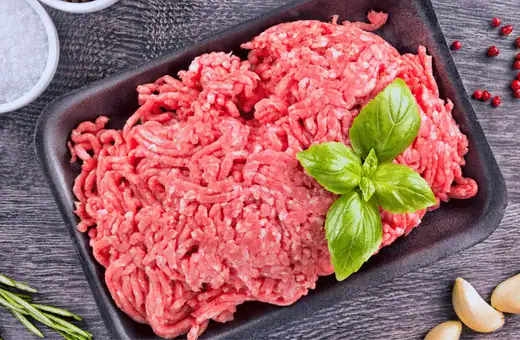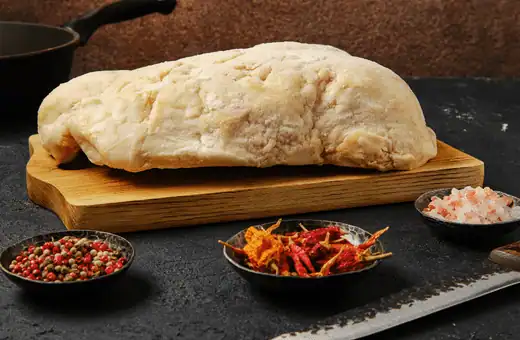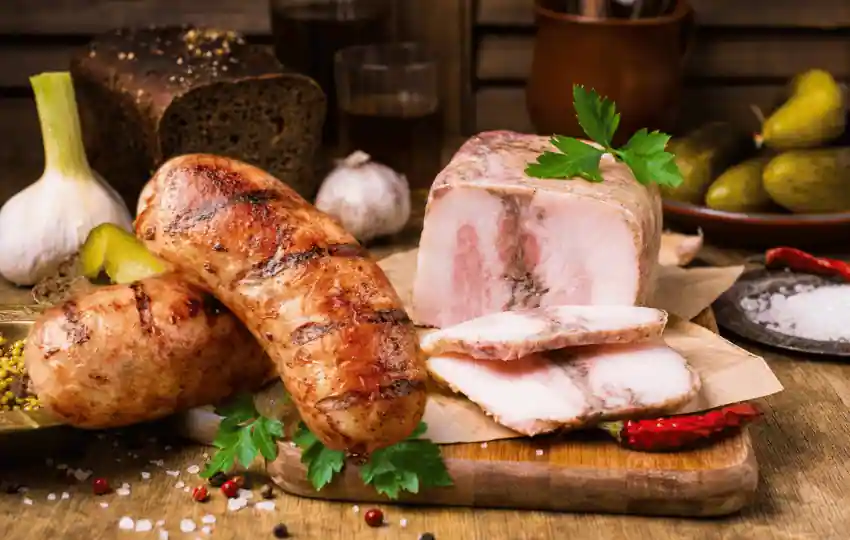Making sausage at home is a fantastic way to customize your favorite recipes and get the exact flavor and texture you’re looking for.
But, when it comes to sausage, one of the most important ingredients is pork fat. It’s what makes the sausage juicy and gives it that classic flavor.
If you can’t find pork fat or don’t want to use it, there are some great substitutes that will get you the same results.
Here are some tips to assist you in making substitutions with ease so you can enjoy homemade sausage without pork fat.
Substitute for Pork Fat in The Sausage
1. Butter or Oil
One of the most common substitutes for pork fat is butter or oil.
While these two ingredients may not have the same richness as pork fat, they can still provide a nice flavor, especially if combined with other seasonings.
Butter is especially good because it has a high-fat content, which helps make the sausage juicy and flavorful.
Olive oil or avocado oil are both excellent choices as well since they are high in healthy fats and add a subtle hint of flavor.
2. Ground Beef
Another option is ground beef. This works best if you’re making Italian-style sausage, but it can also be used in other recipes as well.

Ground beef adds moisture and texture while still providing plenty of flavors.
It’s also much leaner than pork fat, so it won’t add any extra calories or cholesterol to your recipe.
3. Vegetables
If you like an even healthier option, try adding vegetables instead of pork fat.
The veggies will add moisture and texture while still providing plenty of vitamins and minerals that your body needs to stay healthy.
Likewise, you can try mushrooms that are especially good because they have a meaty taste when cooked down, and they also contain natural umami flavors that enhance the overall flavor of your dish.
Other options include finely chopped carrots, celery, onions, bell peppers, spinach, kale, or any other vegetable that you like!
Just make sure to cook them down until they are soft before adding them to your recipe for optimal results.
4. Coconut Oil
Coconut oil is an ideal substitute for pork fat when making vegan sausages as it has a similar texture and a mild flavor that won’t overpower your other ingredients.
It also holds up well under high heat, so it won’t break down during the cooking process.
If you don’t prefer the taste of coconut, this might not be the best option for you, but if you do, then it is worth considering as a substitute for pork fat in your next batch of sausages.
5. Mushroom Broth
The mushroom broth is another great substitution for pork fat in sausage recipes.
It provides moisture and binds ingredients together while adding a savory umami flavor to your finished product.
Additionally, the mushroom broth is low in calories and packed with vitamins and minerals, so it will help keep your sausages healthy without sacrificing taste or texture.
6. Nut Butters
Nut butters such as almond butter, peanut butter, or cashew butter are excellent alternatives to pork fat when making vegan sausages.
They provide moisture and bind ingredients together while adding a rich nutty flavor to your finished product.
Nut butters are also low in calories but high in protein, so they can help keep your sausages healthy while still providing all the flavor you need from pork fat.
7. Bacon Fat
Bacon fat is one of the most popular alternatives to pork fat when making sausage. It adds a smoky, salty flavor and aroma that can make your sausage stand out from the crowd.
To use bacon fat in place of pork fat, simply render it slowly over low heat until all the fat has melted off and you are left with liquid fat.
This can be done in a large skillet or in the oven, and it should take about an hour.
Once cooled, strain off any remaining solids and use this liquid fat as you would pork fat when making sausage.
8. Chicken Fat
Chicken fat is also a great alternative to pork fat when making sausage. It can be rendered in the same way as bacon fat and will add a milder flavor than bacon fat.
Chicken fat is generally easier to come by than bacon fat, so it’s a great option if you don’t have access to pork fat.
9. Duck Fat
Duck fat is another popular option that can be used in place of pork fat when making sausage.
Duck fat has a rich, savory flavor that is sure to add depth and complexity to your sausage.
To render duck fat, simply melt it slowly over low heat until all the solids have melted off, and you’re left with liquid fat.
All in all, if you’re looking for a great option to replace pork fat in your homemade sausages, duck fat should be at the top of your list!
10. Beef Fat
Beef fat is another great option that can be used in place of pork fat when making sausage. It has a strong, beefy flavor that will add richness and depth to your sausage.
Additionally, it works well in combination with other meats and stabilizers.
Beef fat also has a higher smoke point than pork fat, making it less likely to burn during cooking without compromising the taste of the food.
Finally, beef fat creates a better ‘bite’ or texture in meats that makes them more enjoyable to eat.
These qualities place beef fat as one of the top alternatives to pork when making premium sausages and hamburgers.
11. Lamb Fat
If you love sausage but don’t want to work with pork fat, then lamb fat may be the perfect substitute for you. It has a rich, savory flavor that will add depth and complexity to your sausage.
It’s a great way to create delicious sausage without increasing your saturated fat and cholesterol levels.

Combined with other spices and seasonings, this alternative can take your homemade sausages to the next level!
So give lamb fat a try in your next sausage-making endeavor – it might just become your favorite substitute!
12. Venison Fat
Venison fat is another great alternative to pork fat when making sausage.
Venison fat is a great alternative when making sausages due to its ample amount of flavor and nutritional value. It has a strong, gamey flavor that will add depth and complexity to your sausage.
Unlike pork fat, it is much cleaner and carries significantly fewer calories – perfect for anyone trying to live a healthy lifestyle.
From Mexican chorizo to Italian bratwurst, Venison fat will add an extra blast of savory goodness that anyone can appreciate.
Substituting Venison Fat for the pork in your next sausage dish will leave you feeling satisfied without being weighed down by its greasiness.
13. Mutton Fat
Sausage has long been a popular meat dish; however, many now prefer to use more healthy ingredients in their recipes.
Mutton fat is an ideal pork fat substitute as it provides similar flavor and juiciness without the added unhealthy fats and high calories normally associated with pork.
It’s a strong, gamey flavor that will add depth and complexity to your sausage.
Not only does this reduce the quantity of cholesterol and fat one consumes, but its slightly sweet taste can help enhance the flavors of the dish you are making.
While mutton fat can sometimes be difficult to source, for those looking for a healthier alternative, substituting pork fat with Mutton fat is sure to be a flavorful hit.
14. Olive Oil
Olive oil is a popular substitute for pork fat in sausages as it provides an excellent flavor to the sausage and keeps it moist.
It can be used in both raw sausage mixtures or cooked sausages, depending on preference.
To use olive oil, start by replacing one tablespoon of pork fat with two tablespoons of olive oil. This can be increased based on desired flavor and texture.
15. Sunflower Oil
Sunflower oil is a great option when looking to substitute pork fat in sausages.
It has a mild flavor, making it the perfect choice for those who don’t want their sausage to taste too strongly of fats or oils.
To use sunflower oil, replace one tablespoon of pork fat with two tablespoons of sunflower oil.
16. Canola Oil
Canola oil is a great substitute for pork fat in sausages as it has a mild flavor and helps keep the sausage moist.
To use canola oil, replace one tablespoon of pork fat with two tablespoons of canola oil.
Conclusion on substitute for pork fat in the sausage
Finding an ideal substitute for pork fat in sausage-making doesn’t have to be difficult, thanks to these great alternatives!
Coconut oil adds a mild flavor without overpowering other ingredients; mushroom broth adds umami depth; and nut butters provide richness without compromising on nutrition or taste.
Moreover, Butter or oil provides moisture and subtle flavor, while ground beef adds texture without adding too much extra cholesterol or calories.
Vegetables also work great for adding moisture and nutrients without sacrificing taste!
So, no matter which route you choose, these substitutes will help make sure that your sausage recipes remain both vegan-friendly and delicious!
FAQs on substitute for pork fat in the sausage
Q1. What is the best fat for sausage?
Making sausage can be an incredibly rewarding experience, but it’s easy to get overwhelmed in the process of selecting the right type of fat. Pork fat is one of the most typical choices for sausage-making due to its unique combination of tender juiciness and robust flavor.
When it comes to choosing how much pork fat to add, a general rule of thumb is that you should use about 20-30% of your meat weight in pork fat. Some sausages require higher amounts, so always check your recipe or experiment until you find the perfect balance.
Keep in mind that too much pork fat can harm your sausage and make it overly greasy, while too little will cause it to dry and become tough when cooked. Finding just the right amount takes some practice, but with time and experience, you’ll soon become a master sausage maker!
Q2. How much pork fat to add to sausage?
Sausage is a rich, flavorful dish that’s a favorite all across the country. The primary factor in creating a delicious sausage lies in the type of fat used. While any fat can technically be used to make sausage, some are superior to others.
Pork fatback is largely considered to be the best as it adds flavor and texture without overpowering other ingredients. Beef trim and pork shoulder work nicely, too, providing richness and excellent marbling for both texture and taste.
For those looking for healthier options, chicken skin and even leaf lard can be great substitutes that hold up extremely well during cooking. Ultimately, the right fat will depend on personal preference and how you plan on cooking your sausages.

